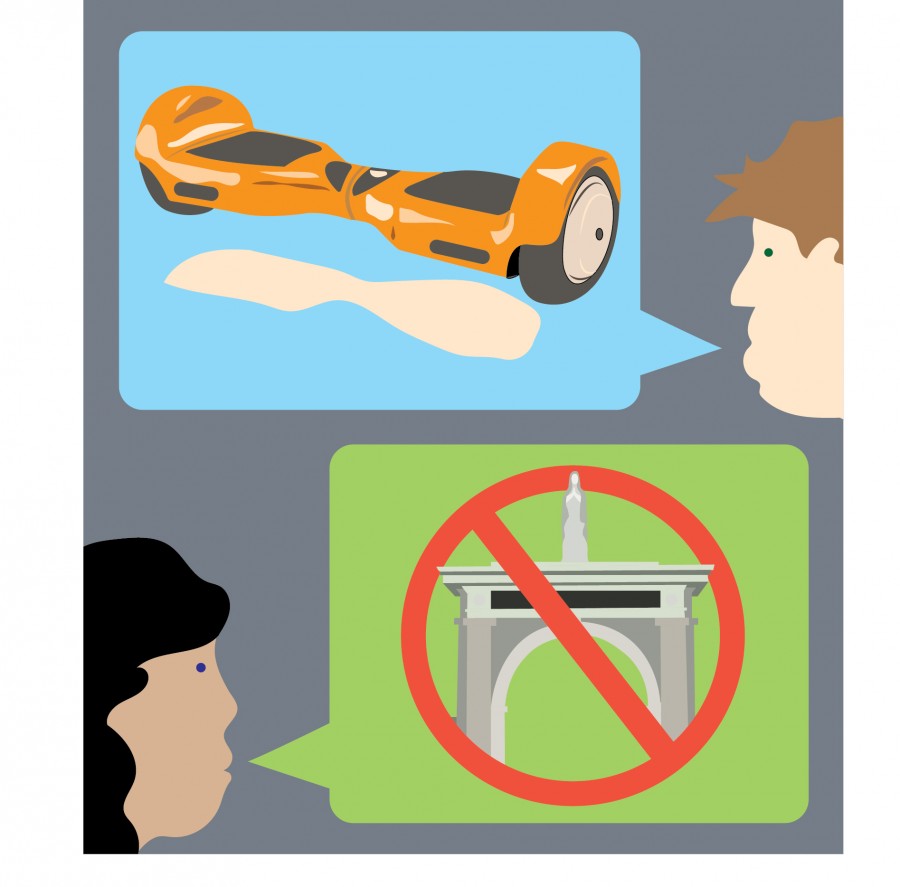Last-minute policy prohibits hoverboards
Photo credit/ Kelsey Van Horn
February 9, 2016
After students returned to campus from winter break, Marywood announced it will be banning hoverboards on campus.
Ross Novak, senior director of student conduct and residence life, sent an e-mail to all students on Jan. 12 stating that Marywood has banned the use, possession or storage of hoverboards on campus. This e-mail was sent on the same day most students were moving back into residence halls and returning to campus after winter break.
The e-mail provided a link to a report from the United States Consumer Product Safety Commission about the safety of hoverboards.
According to this report, there is a safety defect with hoverboards that causes them to catch on fire. The Consumer Product Safety Commission said it is currently testing new and damaged hoverboards to see why some caught on fire while they were charging and why others caught on fire while being used.
In addition to catching on fire, the commission said there are serious injury risks with riding hoverboards.
“We will continue to monitor information provided by the Consumer Product Safety Commission as they investigate reported concerns and work to develop safety standards,” said Novak in the e-mail to students.
Novak said there was no specific incident that occurred at Marywood to cause the ban.
According to abc27 News, other colleges in Pennsylvania have prohibited hoverboards on campus. Elizabethtown College, Lebanon Valley College, and Millersville University have all banned hoverboards.
“The fire safety concern, especially in the context of multiple occupancy dwellings such as the residence halls and high occupancy areas such as classroom buildings and the Learning Commons is what led to the discussion,” said Novak.
Students were not given advanced notice about the hoverboard ban before returning to campus for the start of the spring semester.
“Compiling information, attempting to keep up with the new information and working around staff vacation schedules to discuss in conjunction with the standard tasks which needed to be accomplished during this time, impacted the communication of the new policy,” said Novak. “I acknowledge that the timing was admittedly less than ideal.”
Novak said arrangements have been made with Campus Safety to store hoverboards until students can remove them from campus.
Michael Stracci, resident director of Regina Hall, said he has not encountered any hoverboards with residents. According to Stracci, he has not heard any complaints from students about the ban.
Stracci said he understands that the ban was last minute, especially given that it was right after the holidays.
“I think the hoverboards have become a quick sensation and the holidays probably sparked all of this interest in it,” said Stracci. “I think Marywood reacted the best way they could.”
Stracci said he had a hoverboard on campus and took it home after hearing about the ban.
“I think even though at first I thought it was a little reactionary of them to ban it, but the more and more I think about it, it’s probably for the best in terms of just protecting people,” said Stracci.
Depending on the situation, if a student is found in possession of a hoverboard, he or she may be referred through the conduct process, according to Novak.
“The basis and rationale behind the policy is on maintaining a safe, hopefully fire-free environment,” concluded Novak.
Connor Moffitt contributed to this article.
Contact the writer: [email protected]





